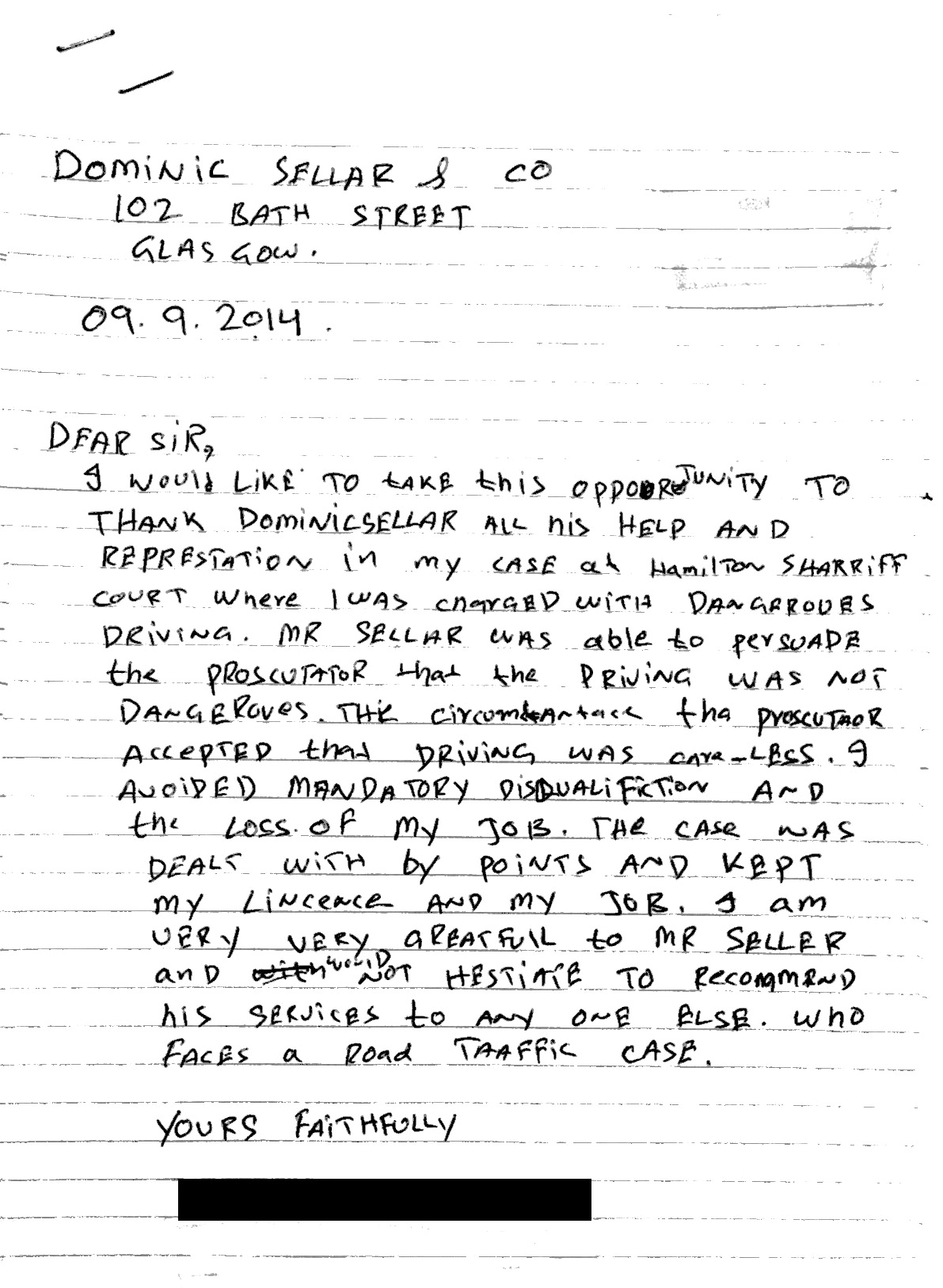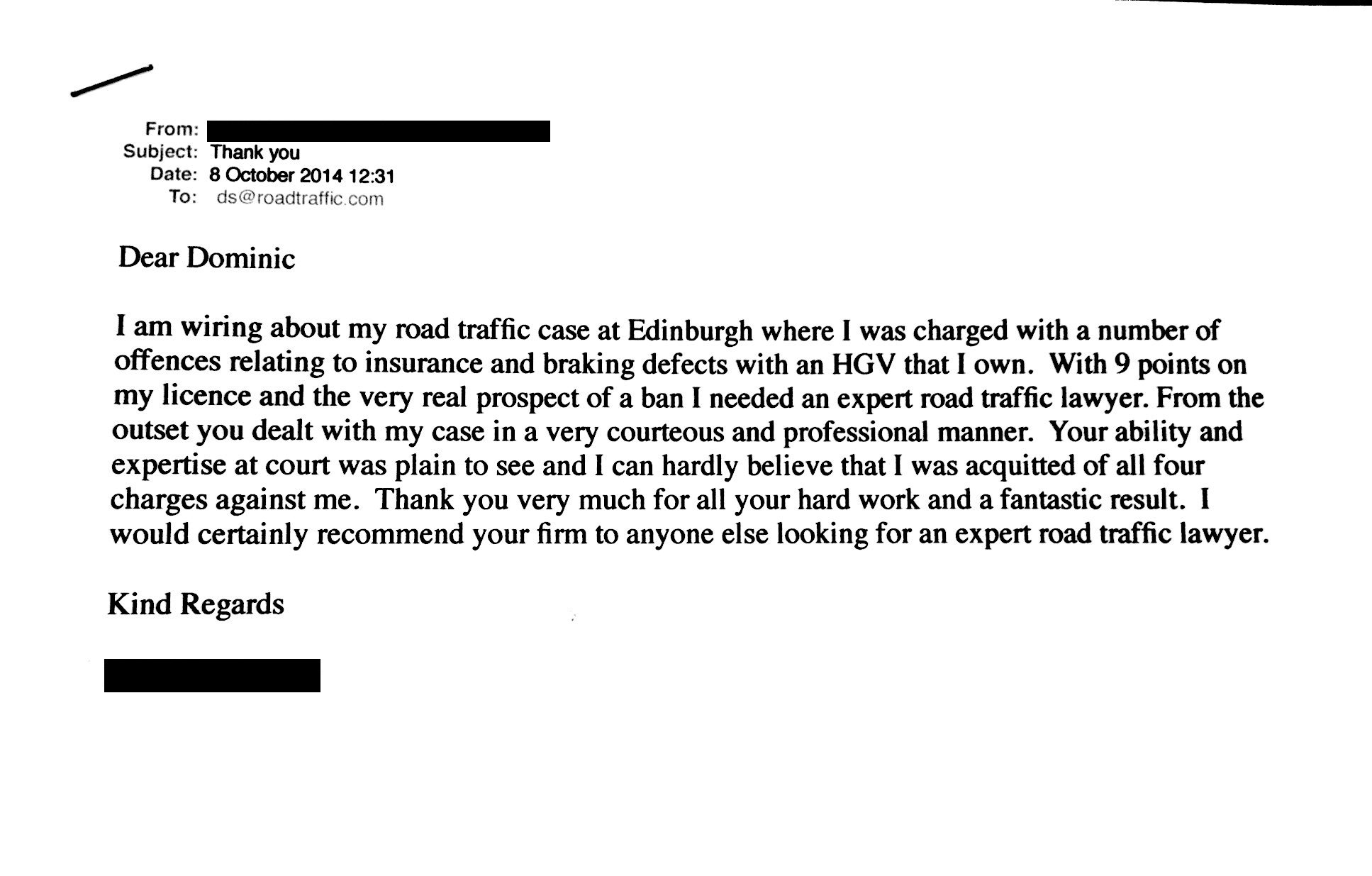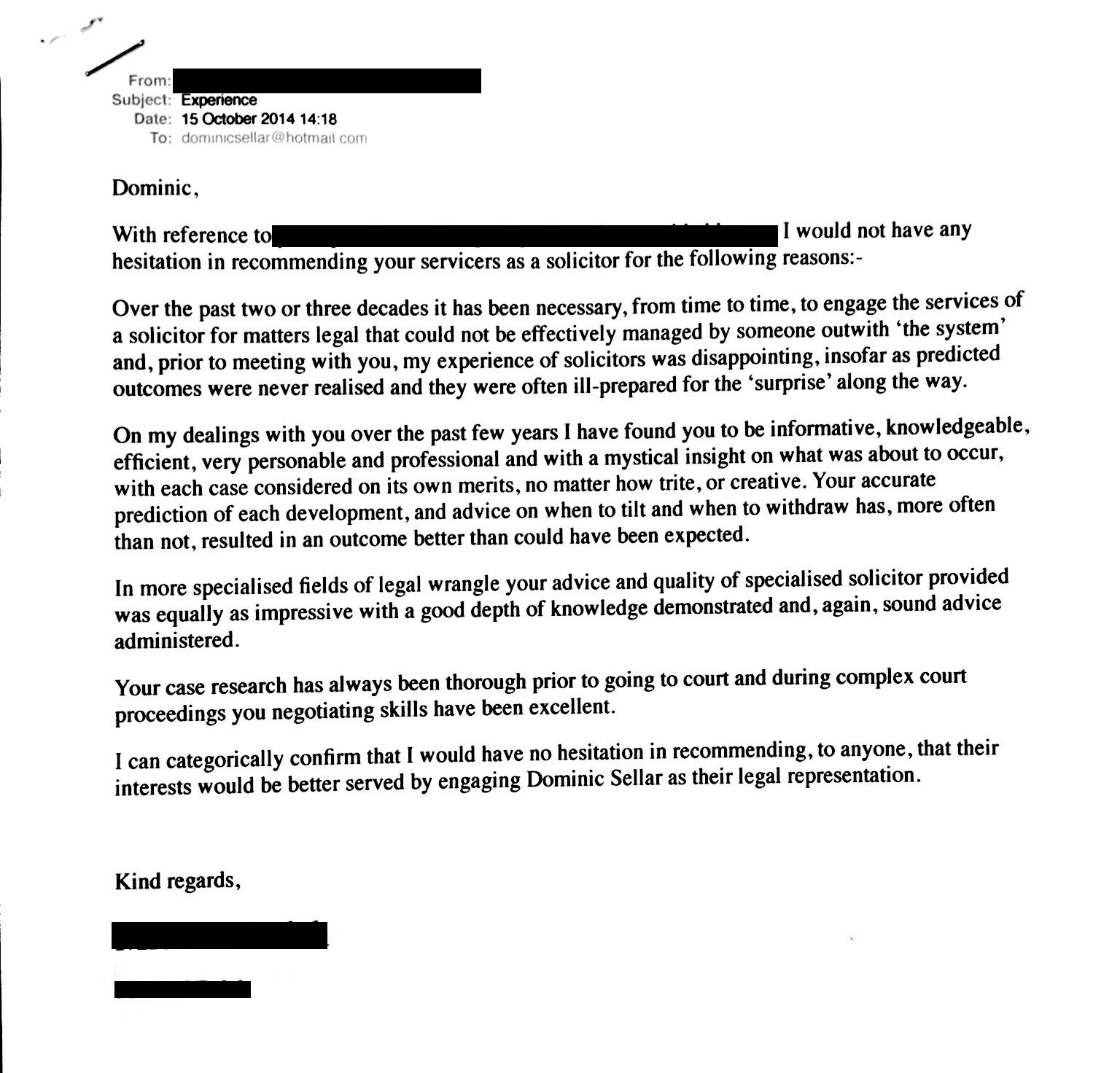Road Traffic Regulation Act 1984
It is an offence to exceed the speed limit that applies to a particular class of road. In practice, however, it is unlikely that a driver will face prosecution if he has exceeded the speed limit by just a few miles per hour. It is not a defence that you only exceeded the speed limit momentarily in order, for example, to complete an overtaking manoeuvre. However, there are a number of defences that may secure an acquittal. Special Reasons may also exist that allow the court to refrain from endorsement or significantly reduce the penalties.
Speeding Bans & Consequences
Speeding Offences attract between 3 to 6 penalty points and a fine. In cases of excessive speed a period of disqualification can be imposed and, where the speed is grossly excessive, a driver can be prosecuted for dangerous driving which carries a mandatory minimum disqualification of 12 months.
Whether you have triggered a speed camera or been stopped by the police a speeding offence will be dealt with either by Fixed Penalty or by a court appearance. How your case is dealt with will largely depend on the alleged speed and the number of existing penalty points on your licence. If a fixed penalty is not accepted a Citation/Summons to attend court will be issued.
An alternative to a fixed penalty or court appearance is the opportunity to attend a Speed Awareness Course. Although widely available in England these courses are seldom offered in Scotland as an alternative to prosecution.
Prosecuting Speeding Cases
Prosecuting a speeding case in Scotland is a relatively complex and technical affair. In Scotland, there must be corroborating evidence. This usually comes from the two police officers who stopped the driver. In short, the police will give evidence about the speed limit in force, the speed of the motor vehicle in question, the identity of the driver and how the alleged speed was measured. Where a conviction is sought for an exact speed there must be reliable evidence that the speed measuring device was working properly.
Calibration & Accuracy Checks
The Police and the Crown cannot claim that the device was accurate at the time of the offence if certain checks and tests are not carried out on a daily and annual basis. This is where certificates relating to calibration and accuracy come into play. Where a speeding case arises from a fixed or mobile camera the evidential procedure is even more complex, requiring a detailed paper trail and up to 6 or more witnesses.
Speed Detection Devices
A wide variety of speed measuring devices are used by the police to measure speed. These include:
- Fixed or Mobile Speed Cameras, such as Gatsometers and Lti20/20
- Hand Held Radar or Laser Guns, such as Falcon and Unipar SL700
- Average Speed Recorders, such as VASCAR, ProVida and Puma, which are used to calculate the average speed of a vehicle over a set distance
- Average Speed Cameras, such as the SPECS system, which uses a series of cameras and number plate recognition to calculate the average speed of a vehicle.
Another method widely used by the police to measure speed is Pacing. This is where the police will simply estimate speed with reference to their own speedometer by maintaining a fixed distance between their vehicle and the suspect vehicle. As with the operation of Average Speed Recorders, such as the VASCAR device, Pacing is a method which is prone to human error and abuse. Issues may also arise in relation to the accuracy of the factory fitted speedometer within the police vehicle.
Defences to a Speeding Charge
The authorities have invested a great deal of resources into the detection and prosecution of speeding offences. As a consequence, the police and those prosecuting speeding offences are very much better at avoiding the mistakes and errors that have frequently resulted in proceedings being dismissed. However, mistakes still happen and these can be exploited in favour of the driver to secure an acquittal.
There are several established defences that can be used to challenge a speeding offence which ranges from factual defences of mistaken identity or a denial that the vehicle was driven in excess of the speed limit to technical defences which require a comprehensive understanding of all the issues and expert evidence.
Errors in Procedure
One of the most common ways of defending a speeding offence is to establish that the police have not carried out essential checks or procedures. Failure to carry out essential checks or follow proper procedure is often fatal to the prosecution. The prosecution must also ensure that their case is properly prepared and that all the relevant evidence is properly placed before the court. Again mistakes can arise during the course of a case that may prove fatal for the prosecution.
Unreliable Equipment
Where the speed is measured on a device the prosecution must prove that the speed measuring device is approved for use, and that it was operating correctly and was correctly operated by the police at the time of the offence. If there is any doubt about any of these issues, the benefit of that doubt should be given to the accused and he should be acquitted.
Documentary Evidence
The prosecution may attempt to prove that a device is accurate and reliable by producing documentary evidence. This might include a certificate of calibration and a certificate of accuracy in respect of the device used to measure the alleged speed. The prosecution may also seek to produce photographic evidence. It is important to note that even this type of evidence does not, in itself, provide conclusive proof of a speeding offence. Moreover, it should not be assumed that certificates and photographic evidence cannot be challenged. They can, but this must be properly done otherwise the advantage will be lost.
Time Limits
Another common defence relates to the time limits that apply to these offences. For example, court proceedings must be raised within 6 months. Furthermore, a driver must be warned that he is facing a prosecution within 14 days from the date of the offence. This is done by a Notice of Intended Prosecution (NIP). In camera cases, a NIP will be posted to the registered keeper of the vehicle. If a driver has been stopped by the police for a speeding offence a verbal NIP can be given.
In some cases, evidential documents, such as certificates of calibration, must be provided to the accused within certain time limits. Failure to do so may result in proceedings being deserted.
Speed Limits
The prosecution must establish the speed limit that is in force on the road where it is alleged that the speeding offence occurred. Road traffic signs have an obvious and important part to play in most speeding offences, but they are not the only means by which a speed limit is conveyed. On some roads, the speed limit is conveyed by a system of street lighting.
There is a duty on Local Authorities to erect and maintain traffic signs to provide adequate guidance to drivers about the applicable speed limit that applies to a particular road. Much of the law relating to traffic signs and road markings is contained in the Traffic Signs Regulations & General Directions 2002. This provides detailed provisions relating to the type, size and positioning of traffic signs. A failure to observe these regulations may also prove fatal to the prosecution’s case.
Special Reasons
As with other road traffic offences it may be possible to establish that “Special Reasons” apply. A Special Reason is not a defence to a charge of speeding, rather it is a unique circumstance that explains why the offence was committed. For example, if a driver is speeding because of a medical emergency then this may amount to a Special Reason. If Special Reasons are established the court can refrain from imposing penalty points or disqualification.

How we can help
The law relating to speeding offences is surprisingly technical and complex. Whether or not an offence can, or should be defended, will depend on a wide number of factors about the case and your own circumstances. Our experience and expertise in this area will quickly determine the best option for you. Getting the right advice can save time, expense and your licence. If prospects for success are low we will concentrate on damage limitation. As specialist road traffic lawyers we are best placed to offer you the right advice. We pride ourselves in offering a service that is friendly, honest and reliable. For free advice that is without pressure or obligation simply contact us:
Call Now or Request a Callback
Independent Reviews
Go online or have a look at the reviews below to see why we’re the right solicitors for you.
Trustpilot
Google
Facebook
Client Letters
-
I honestly couldn’t praise Dominic enough!!
I honestly couldn’t praise Dominic and this fantastic company enough. I had direct communication from Dominic after I was recommended to acquire their services. Dominic was first class from the off, kept me updated through out and was an absolute gentleman. So my advice would be if you require any assistance in terms road traffic […]
-
Excellent lawyers firm.
I had a drink driving charge and speeding charge. I found Dominic Sellar & Co online. Dominic discussed my case with no obligation telephone consultation and advised me of what lay ahead. I decided to use his support & services.Dominic was not able to attend court on the day of my case but his partner […]
-
Dominic Sellar & Co
Dominic Sellar & Co. left a lasting impression with their remarkable and thorough approach. Their meticulous attention to detail and commitment to excellence were evident throughout the entire process. The professionalism and expertise demonstrated by the team were truly commendable, making the experience both impressive and reassuring.
-
Speeding Driving Charge – 1st Class Service
Recently hired Dominic for a speeding charge I received. My experience was first class from start to finish upfront cost no hidden charges and communication from Dominic at all times was amazing only a phonecall away.
-
Multiple Charges
I was facing multiple charges and Dominic sorted Everything out. I’m absolutely delighted by the outcome. And would recommend him to anyone needing a traffic lawyer.
-
Honest and trustworthy service
facing a very difficult situation of a lengthy ban Dominic managed to fight my corner which resulted in a more manageable short term ban. What I liked about Dominic was that he was very straight talking and was very honest. Wouldn’t hesitate to recommend him.
-
Dominic was great from the start
Dominic was great from the start, advice and possible outcomes. Handled my case with minimum fuss. The outcome was better than I could have hoped for. Hopefully I will not need you again, but should I face the same predicament I wouldn’t go anywhere else. Highly recommend. Thank you again.
-

Mr SF, Glasgow
“I would like to take this opportunity to thank Dominic Sellar for all his help and representation in my case at Hamilton Sheriff Court where I was charged with Dangerous Driving. Mr Sellar was able to persuade the prosecutor that the driving was not dangerous…the Prosecutor accepted that the driving was careless. I avoided a […]
-

Mr K, Manchester. Construction & Use Case
“I am writing about my road traffic case at Edinburgh, where I was charged with a number of offences relating to insurance and braking defects with an HGV that I own. With 9 points on my licence and the very real prospect of a ban I needed an expert road traffic lawyer. From the outset […]
-

Mr BM, Aberdeen
“…I would not have any hesitation in recommending your services as a solicitor…I have found you to be informative, knowledgeable, efficient, very personable and professional and with a mystical insight on what was about to occur, with each case considered on its own merits, no matter how trite, or creative. Your accurate prediction of each […]
